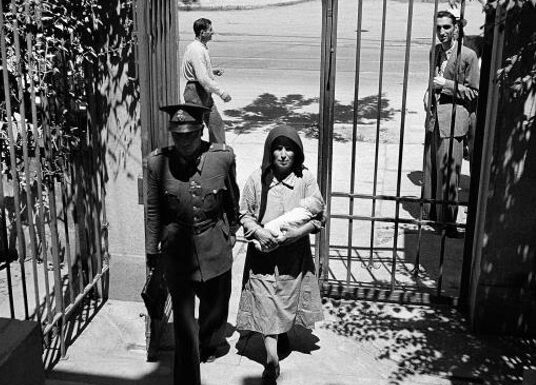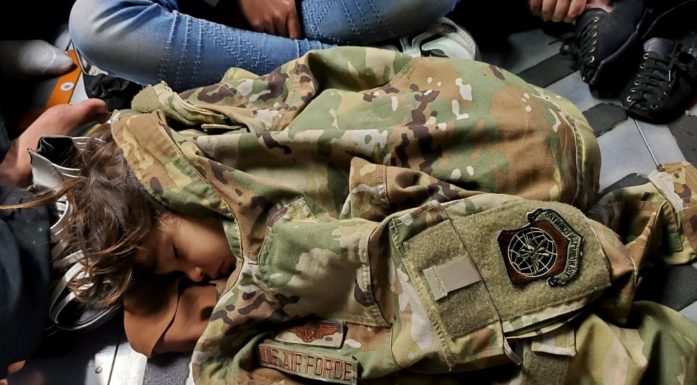When rape becomes a weapon in war
Sexual violence in war is attracting more attention thanks to the 2018 Nobel Peace Prize. But nothing suggests that the abuse is lessening.
Sometimes the most talk about men happens in lawless places.
“Sexual violence takes place where social norms have disappeared. We’ve seen it in Yugoslavia, in Syria and in Rwanda,” says Professor Jo Jakobsen.
The dissolution of the unwritten social rules in a society opens the door for assaults, killings and thievery, and for individuals to operate for their own gain.
These conditions affect the mood of a region and the limits of what is considered right and wrong, Jakobsen says. He works in NTNU’s Department of Sociology and Political Science.
Every conflict varies in how widespread sexual violence is. However, such assaults occur in virtually all wars where the civilian population comes in close contact with the combatants.
“Sexual violence occurs where social norms disappear.”
Article continues below photo.
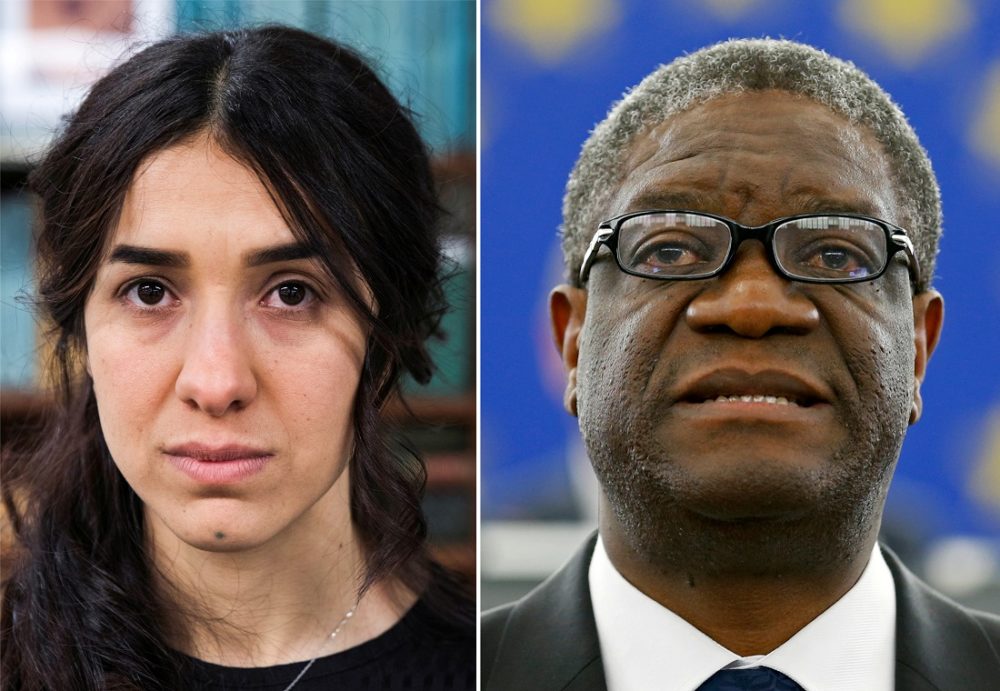
Nadia Murad and Denis Mukwege received the 2018 Nobel Peace Prize for their efforts to stop the use of sexual violence as a weapon in war and armed conflicts. Photo: Reuters / NTB Scanpix
Abuse as strategy
In some cases, the sexual assaults are conducted systematically. In Rwanda, separate divisions of HIV-infected men were set up to deliberately infect as many Tutsis and moderate Hutus as possible.
“Sexual violence against women is a weapon. You’re punishing both the woman and the man. Honour is often closely linked to women and their rights,” says the professor.
Denis Mukwege and Nadia Murad received the 2018 peace prize for their “efforts to stop the use of sexual violence as a weapon in war and armed conflicts.”
Gynecologist Mukwege has helped thousands of victims of sexual violence in the Democratic Republic of the Congo (DR Congo). Murad is a former victim of war crimes in Iraq who has spoken up to share her own abuse experiences.
Sexual assaults often end up in the background when war takes so many lives. As many as two million German women were raped when the Russians gained the upper hand during and after World War II. Of these women, 240 000 are estimated to have died. When did you last read about these atrocities?
People are reduced to numbers if the sexual violence is widespread enough.
“Sexual assault against women is a weapon. You’re punishing both the woman and the man. Honour is often closely linked to women and their rights.
Convictions rare
Sexual violence in war is hardly a new phenomenon. But the modern-day response to it is – in part – still new and emerging.
International rules against sexual abuse in war have been in place for at least a century. But until Rwanda in the 1990s, no one had been convicted of the crime.
Last year a special sentence was pronounced in Guatemala.
“This was the first time a national court convicted anyone of sexual slavery as a war crime,” says Associate Professor Karin Dyrstad in NTNU’s Department of Sociology and Political Science.
The violence in Guatemala happened in the 1980s when an estimated 200 000 people were killed, the vast majority by government forces. It took time to sentence individuals for sexual violence afterwards, but it did eventually happen.
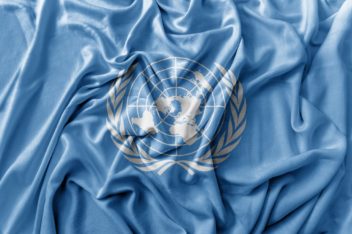
UN soldiers, the very ones who are there to protect the civilian population, have repeatedly been arrested for sexual assault. Photo: NTB Scanpix, Shutterstock
Any warring parties can perpetrate sexual assaults in war. UN soldiers, the very individuals often assigned to protect the civilian population, have repeatedly been arrested for sexual violence.
“Sexual abuse in homes also increases in war zones,” says Dyrstad. Whether this is due to stress or other causes is hard to say.
- You may also like: : Scientists say 55,000 Norwegians suffer after-effects of trauma
More attention
“I don’t think we can say whether sexual violence in war is more or less common than previously,” says Dyrstad. “But more attention has been paid to it the last five to ten years, and that’s a positive.”
Ancient Greeks looked at women as legitimate spoils of war. The Romans regarded women as the property of men, and therefore an assault against a woman was a crime against the man who owned her.
During WWII, the SS Court sentenced people to death for rape in Norway, while on the eastern front assaults took place on a large scale. A lot depends on local conditions.
Very little has changed over the past few decades.
“We don’t see any indication that sexual abuse has become less prevalent,” says Jakobsen.
“I don’t think we can say whether sexual violence in war is more or less common than previously.”
Ethnic cleansing
During the war in Bosnia, an estimated 50 000 women were raped, mostly Muslim women by Serbian offenders.
Local activists reported from the Balkans about “rape camps” that had the goal of getting Croatian and Muslim women pregnant by Serbian men.
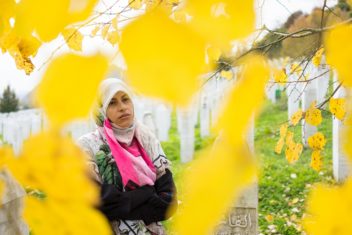
From Srebrenica in Bosnia, a memorial centre for those who were subjected to war crimes. Photo: NTB Scanpix, Shutterstock
In cases like this, sexual violence constitutes a part of ethnic cleansing. In patriarchal societies, the children adopt their father’s ethnicity.
Dyrstad believes the sexual norms that already exist in an area play a significant role. In a culture where men are strongly dominant, the risk of sexual assault is likely to be greater.
This was true for the conflicts in Iraq and Syria.
In 2014, Nadia Murad was captured by the IS in northern Iraq when she was 19 years old. She belongs to the Yazidi minority, and was therefore considered a legitimate target. Six close relatives were among the 600 who were killed within a short time. The young women became slaves.
Murad was raped and abused in other ways until she managed to escape. Afterwards, she was was given an audience at the UN to tell her story.
Murad was far from alone. The IS captured up to 6700 Yazidi women.
But other countries than those in the Balkans, Syria and Iraq stand out in recent decades due to the massive scale of abuse.
“Nearly all the women who survived the genocide were direct victims of rape or other sexual assault, or were heavily affected by it.”
Where everyone became victims
Rwanda has two dominant ethnic groups, the Hutus and the Tutsis. In 1994, approximately 800 000 Tutsis and moderate Hutus were killed during the 100 days of lawless genocide in Rwanda. An estimated 250 000 to 500 000 women and girls were raped during that time.
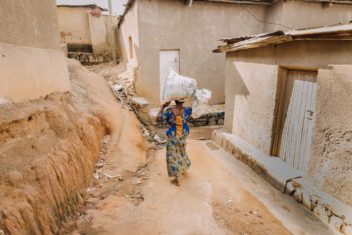
The city of Kigali in Rwanda is so calm today that it’s hard to imagine the massive assaults that happened here. Photo: NTB Scanpix, Shutterstock
“Nearly all the women who survived the genocide were victims of rape or other sexual violence, or were heavily affected by it,” concluded a report from the Organisation of African Unity.
“Violence was the rule and its absence the exception,” said UN human rights envoy Rene Degni-Segui.
Rape was clearly part of the ethnic cleansing in Rwanda. Between 2 500 and 10 000 children were born as a result of the sexual assaults. Many abused women left their husbands afterwards because the men had not managed to protect them.
The many men who were raped or subjected to other sexual assaults in Rwanda have rarely come forward. The social taboos remain too strong.
After the war in Rwanda, many survivors fled to neighbouring countries. In the Democratic Republic of Congo, Hutus and Tutsis are still fighting, and civilians continue to be subjected to assaults on a massive scale.
Denis Mukwege’s hospital in Bukavu, DR Congo primarily treats women who are victims of what is – at least partly – a continuation of war after Rwanda.
“Violence was the rule and its absence the exception.”
International reactions have little impact
Jakobsen believes that the Nanjing massacre in China was a turning point of sorts in modern times, where the horrors against the civilian population reached new heights.
An estimated 80 000 Chinese women and girls were raped by the Japanese occupation forces during six weeks in 1937. Many of them were killed afterwards. As many as 300 000 civilians lost their lives.
Japan is still denying that such massive abuses took place, despite the fact that journalists from several countries documented them. In actuality, international pressure rarely has much impact.
“I don’t think international courts matter to the individual who commits the abuse,” said Jakobsen.
Prior to the Rwandan atrocities in 1994, the UN was warned that something terrible was about to happen. But the international community did little, and the UN pulled out instead. It was up to the Rwandan Patriotic Front (FPR) to stop the brutality.
“I don’t think international courts matter to the individual who commits the abuse.”
Prompt reaction important
“After Rwanda and the Balkans, a line needs to be drawn. But since then we’ve seen the same things happening in Syria, DR Congo and somewhat in Sudan,” Dyrstad says.

The international community reacts with empty talk, or does too little too late. Often it would be possible to intervene far earlier. Photo: NTB Scanpix, Shutterstock
The international community tends to react with empty talk, or does too little, too late. Often it would be possible to intervene far earlier.
“It’s a danger signal when civilians are involved to a great degree,” says Dyrstad. “That’s when the international community should respond. The sooner, the better.”
Nor does Dyrstad believe that the threat of punishment by any international court has any impact on the individual perpetrator. But she believes that international pressure can at least influence governments.
Dyrstad emphasizes that even government soldiers commit these crimes, not just lawless bandits or paramilitary groups.
Sexual assault is used as an active and systematic instrument both for creating internal unity and as a strategic weapon to harm the enemy as much as possible.
But states can wield influence by implementing clear rules, instructions and penalties for these crimes. States exposed to pressure may be forced to do what they can to prevent sexual violence. Dyrstad points out President Bashar Al-Assad in Syria as an example.
“Not only the IS commits sexual violence in Syria,” says Dyrstad.
If nothing else, it has to at least be possible to prevent or limit people in UN forces from becoming abusers.
“It’s a danger signal when civilians are involved to a great degree. That’s when the international community should respond. The sooner, the better.”
Traumatizing consequences
Associate Professor Cecilie Therese Hagemann works at the Women’s Clinic at St. Olavs Hospital in Trondheim. Part of her job is to meet with women and men who have been subjected to rape.
About 1 800 people seek out the assault centres in Norway each year. As the threshold for speaking up gradually drops, the number is growing. With few exceptions, those who come to the centres are women. The taboos for men are stronger.
The percentage of people who suffer aggravated assault connected to rape in Norway is fortunately low. Weapons or chokeholds are involved in just six per cent of cases.
“We see very few serious physical injuries in connection with rape,” says Hagemann.
She has never seen anyone at the centre who has been infected with HIV following rape. Pregnancy is the exception. Sexually transmitted diseases are not any more frequent than in the rest of the population. Some of the most common consequences of sexual violence in war are very rare here.
“Occasionally we observe that people closest to the victim struggle the most afterwards, not the patients themselves.”
Some patients struggle with guilt. “Why did I drink so much, why did I go home with my husband?” These are different problems than most victims of war have to contend with. But many victims also deal with similar issues after the assault.
“Some people struggle with sleep problems and nightmares. Others avoid situations and places that remind them of the abuse. Some may have partners who blame them. They may have problems with their sex life. Sometimes those closest to the victim, and not the patients themselves, struggle the most afterwards,” says Hagemann.
Article continues below photo.
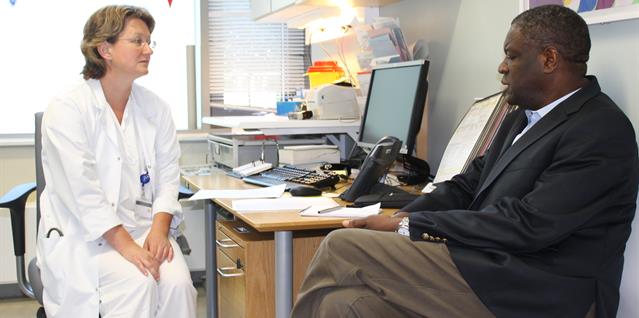
Cecilie Therese Hagemann and Denis Mukwege met in the summer of 2013. Photo: Trond Ludvigsen, St. Olav Hospital
Well deserved peace prize
Jakobsen, Dyrstad and Hagemann all believe the 2018 peace prize was well-chosen. Hagemann met Denis Mukwege when visiting St. Olavs Hospital in 2013.
“A fantastic man,” said Hagemann.
She also thinks it was a good idea for Murad to share the prize. Murad, as a former victim, has made the issue more visible, and Mukwege has worked to alleviate the situation for thousands of women and also trained others to help for many years.
Several things impressed Hagemann about Mukwege, including that he declined an invitation to attend the World Conference she was part of in Brazil because he preferred to spend the time in DR Congo to help patients and educate health professionals.
Unfortunately there is little indication that he and others in the field will be unemployed anytime soon.

